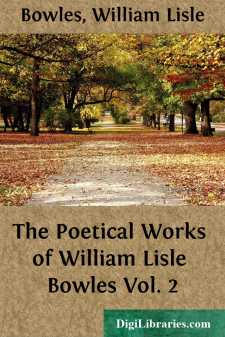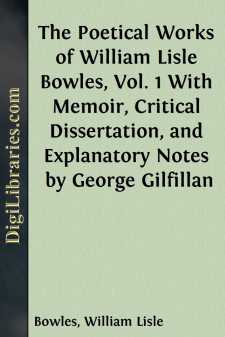Categories
- Antiques & Collectibles 13
- Architecture 36
- Art 48
- Bibles 22
- Biography & Autobiography 813
- Body, Mind & Spirit 142
- Business & Economics 28
- Children's Books 17
- Children's Fiction 14
- Computers 4
- Cooking 94
- Crafts & Hobbies 4
- Drama 346
- Education 46
- Family & Relationships 57
- Fiction 11829
- Games 19
- Gardening 17
- Health & Fitness 34
- History 1377
- House & Home 1
- Humor 147
- Juvenile Fiction 1873
- Juvenile Nonfiction 202
- Language Arts & Disciplines 88
- Law 16
- Literary Collections 686
- Literary Criticism 179
- Mathematics 13
- Medical 41
- Music 40
- Nature 179
- Non-Classifiable 1768
- Performing Arts 7
- Periodicals 1453
- Philosophy 64
- Photography 2
- Poetry 896
- Political Science 203
- Psychology 42
- Reference 154
- Religion 513
- Science 126
- Self-Help 84
- Social Science 81
- Sports & Recreation 34
- Study Aids 3
- Technology & Engineering 59
- Transportation 23
- Travel 463
- True Crime 29
William Lisle Bowles
William Lisle Bowles (1762–1850) was an English poet, critic, and clergyman known for his influence on the Romantic poets, particularly Samuel Taylor Coleridge and William Wordsworth. His most notable work, "Fourteen Sonnets," published in 1789, emphasized nature and personal emotion, marking a shift from the neoclassical style. Bowles also engaged in literary criticism, notably in his "Letters to Lord Byron," where he debated the merits of poetry and sparked a controversy with Byron himself. In addition to his poetry, Bowles served as a clergyman, holding various ecclesiastical positions, including prebendary of Salisbury.
Author's Books:
Sort by:
The poetry of each age may be considered as vitally connected with, and as vividly reflective of, its character and progress, as either its politics or its religion. You see the nature of the soil of a garden in its tulips and roses, as much as in its pot-herbs and its towering trees. We purpose, accordingly, to compare briefly the poetry of the past and of the present centuries, as indices of some of...
more...
PREFACE. A Ninth Edition of the following Poems having been called for by the public, the author is induced to say a few words, particularly concerning those which, under the name of Sonnets, describe his personal feelings. They can be considered in no other light than as exhibiting occasional reflections which naturally arose in his mind, chiefly during various excursions, undertaken to relieve, at...
more...



